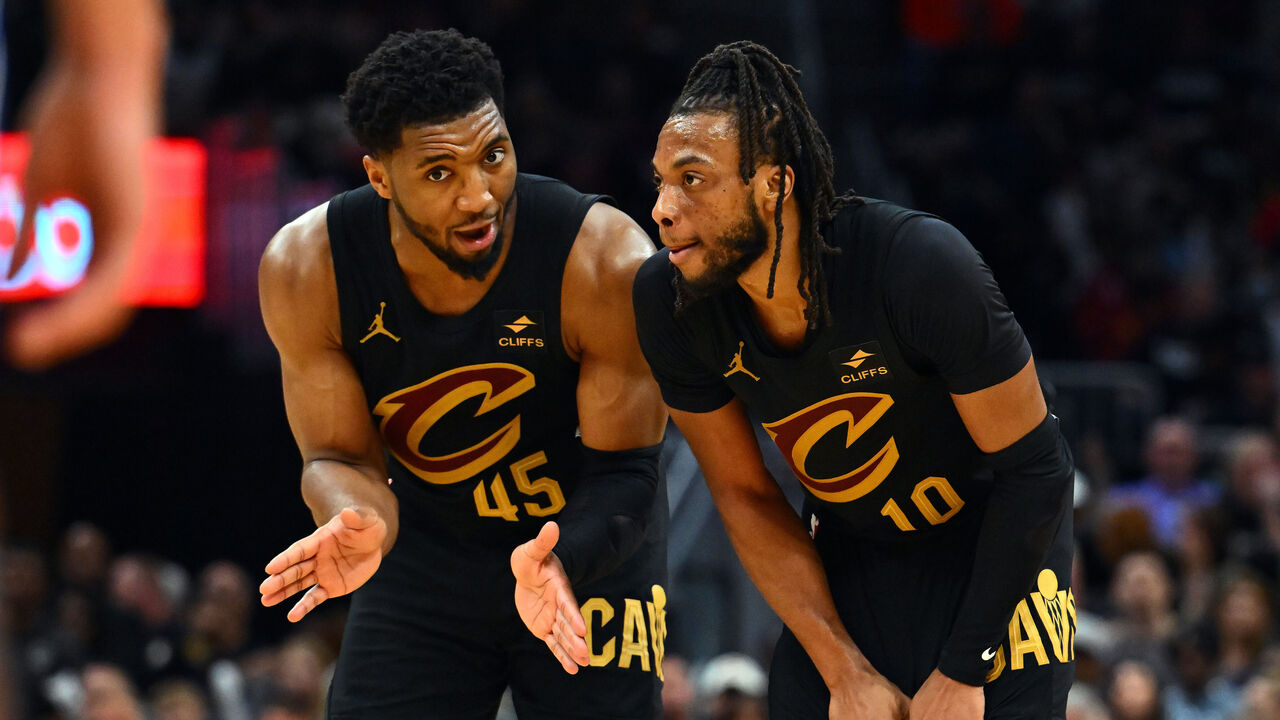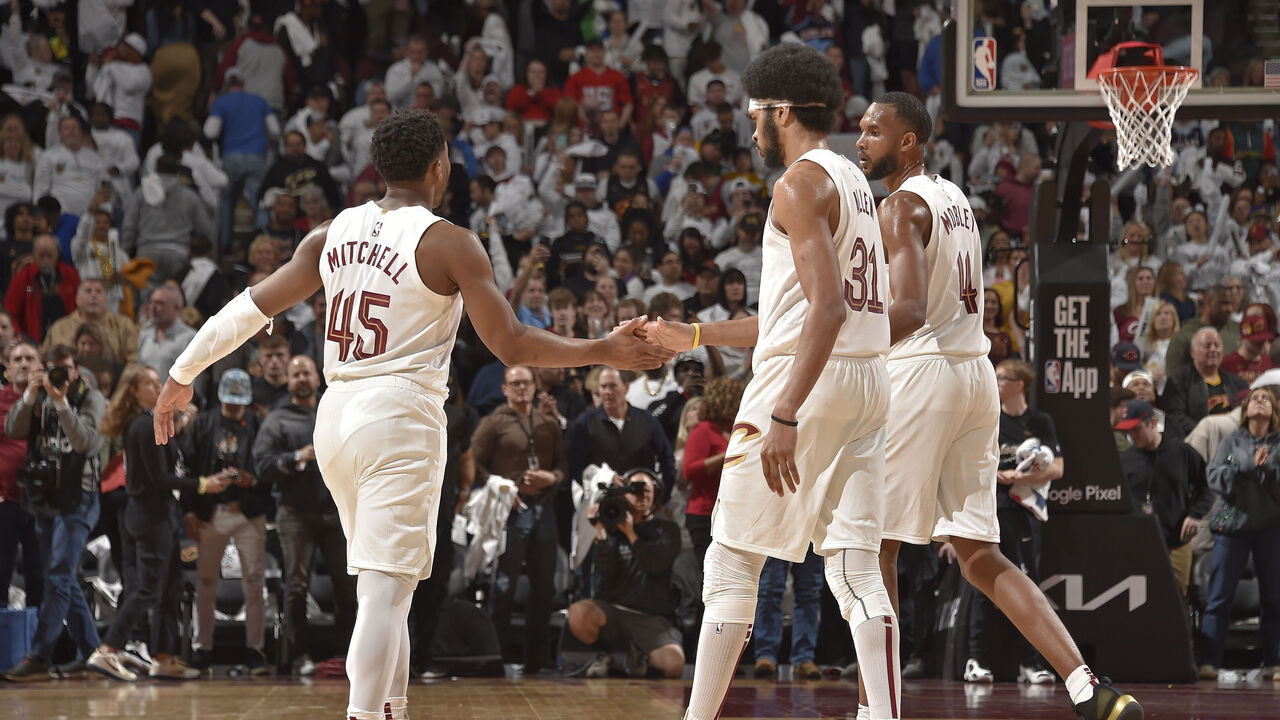Are Cavs progressing or spinning their wheels?
What the Cleveland Cavaliers did this year technically counts as progress. They won a playoff series, which they hadn't done without LeBron James in over 30 years.
But winning 48 games, posting the league's 12th-best net rating, squeaking past an inexperienced and offensively challenged Orlando Magic team in seven games (after engineering that matchup by overtly tanking the last game of the regular season), and then bowing out in five against the Celtics doesn't feel like much to celebrate, especially given the precarity of the Cavs' competitive window and the price they paid to pry it open.
There were extenuating circumstances, of course. Donovan Mitchell, Darius Garland, and Evan Mobley missed a combined 84 games during the regular season, Jarrett Allen missed the team's last eight playoff games, and the four of them were on the court together for just 457 minutes including the postseason. Garland couldn't get his season on track after breaking his jaw, and he never seemed comfortable playing through contact thereafter. Mitchell was hampered by a knee injury throughout the second half of the campaign and had to join Allen on the shelf for Games 4 and 5 against Boston due to a calf strain, effectively sealing Cleveland's fate.
But it's not like things looked seamless on the rare occasions when everyone was healthy. For one reason or another, neither the Mitchell-Garland backcourt nor the Mobley-Allen frontcourt were as synergistic as they were last season, even though three of those guys were as good or better individually than they were in 2022-23. Despite bumping Isaac Okoro to the bench in favor of a much cleaner-fitting Max Strus, the starting lineup went from scoring 121.6 points per 100 possessions to just 112.7, and the Cavs as a team fell from seventh to 16th in offensive rating. Their most inspiring stretch was a run of 17 wins in 18 games that largely came with both Garland and Mobley out of the lineup.
The reporting that's come out in the wake of their playoff exit doesn't exactly paint a picture of a harmonious locker room, either; rumblings of dissatisfaction with coach J.B. Bickerstaff, frustration with Allen for not playing through a rib bruise, and a possible desire on the part of Garland and his reps to find him a new home if Mitchell opts to stay long term.
It's now up to the front office - and Mitchell, who has just one guaranteed year left on his contract - to cut through the noise and decide what this iteration of the Cavs is truly capable of, and to what extent their moderate success this season can be built upon. This is a talented team that's still very young. At the very least, there should be plenty of options for reconfiguration if that's deemed necessary. Mitchell has the power to make that decision for them; if he doesn't sign the four-year max extension Cleveland will assuredly offer him this summer, the team will have to explore trading him, lest he walk for nothing a year from now.

When the Cavs gave up Lauri Markkanen, Collin Sexton, and three first-round picks to acquire Mitchell, it was an uncommonly big gamble for a small-market team that wasn't in the realm of title contention at the time. The hope was that the three years left on his contract would give the franchise enough runway to ascend into that stratum, and in the process convince him to forgo his long-reported desire to play in his home state of New York. But two of those three years are now in the rearview, and that championship pursuit is hardly off the ground.
If anything, the tanking directive from management on the last day of the regular season - when a top-three seed that could've staved off the Boston matchup until the conference finals was still up for grabs - was a clear vote of no confidence in the team's ability to make a deep run or even beat an experienced first-round opponent. The focus was instead on giving themselves the best possible chance to win a single series. Mission accomplished, I guess.
Now it's up to Mitchell, who is reportedly "singularly focused on winning and wanting Cleveland to aim much higher than a first-round-series victory for its measure of success," to decide whether there's enough here to extend the runway further.
You can't say he hasn't held up his end of the bargain to this point, even if Markkanen's All-Star ascension makes the trade look a lot costlier in hindsight. Mitchell remains one of the most potent driving and pull-up shooting threats in the league, and continues to level up as a playmaker and defender. He was the Cavs' best player by a country mile this season, and by far the biggest reason they were able to overcome a gigantic, physical Magic team that overwhelmed most of his teammates. In Games 6 and 7 of that series, he scored 89 of Cleveland's 202 points. The team was 9.3 points per 100 possessions better during the regular season, and 16.1 points per 100 better during the playoffs, with him on the floor.
If he's gone, it significantly alters the direction of the franchise and almost certainly forces the front office to take a longer view. If he re-ups, it's full steam ahead, and other difficult decisions will have to be made about the pieces that do and don't make sense around him. The financial challenges alone will be onerous, with Garland already on a rookie max and Mobley about to become eligible for one. Even with Allen and Strus on team-friendly midsize deals for the next couple of years, Cleveland is going to have a hard time paying all of these guys. But deciding which of them should stay and which should go will not be easy.
Mobley likely isn't going anywhere; 22-year-olds with DPOY finalist on their resumes don't grow on trees. Despite some major offensive struggles in the Orlando series, this was ultimately an encouraging playoff run for him after last year's debacle against the Knicks. Against a smaller Celtics team in the second round, he showcased his fluid face-up and short-roll game en route to averaging 21-9-3 on 66% true shooting. And it will be lost on no one that he did so while playing center all series.
Again, though, that was against the undersized front line of a team missing its own starting center. Cleveland still got worked on the glass in the series, as it did when Mobley played without Allen throughout the season. Not only does playing the two of them together allow the Cavs to access a higher level of defensive versatility, for the last two seasons they've also performed better offensively with both bigs on the floor than they have with Mobley as the lone big. Their most productive alignment by far this year was actually with Allen as the lone big. He was tremendous at both ends, and he's developed crackling chemistry with Mitchell.

All of which is to say, the prospect of trading Allen in order to make Mobley a full-time five is more complicated than it might appear. But the Cavs do clearly need more quality two-way wing play, even with the Strus addition and the offensive strides made by Okoro (which largely fell by the wayside in the playoffs). Okoro can probably be retained on a reasonable deal in restricted free agency, but if Mitchell signs on the dotted line, trading one of Allen or Garland becomes their best way to address that need. And even if Garland makes more sense as a trade piece from a roster-building perspective, he might have less trade value than Allen right now given the disappointing season he just had and the discrepancy in their contracts.
The Cavs would also have to find a way to replace some of Garland's ball-handling and playmaking, lest they saddle Mitchell with too much of that responsibility and fall off even harder with him on the bench. One of the fun quirks of this team was that it had two distinct guard-big tandems that were almost equally dominant this year. According to PBP Stats, with Mitchell and Allen on court and Garland and Mobley off, the Cavs outscored opponents by 11.5 points per 100 possessions. With Garland and Mobley on and Mitchell and Allen off, they outscored opponents by 10.8 points per 100.
Unfortunately, synergizing those two entities remains a challenge, and it's hard to thrive in the world of shortened playoff rotations when your four best players perform better as separate duos than they do as a quartet. Garland is better than he showed this season, but he may not get to access the full breadth of his offensive capabilities next to Mitchell (even if their skill sets are less duplicative than people think). He's always going to be the defensive weak link that gets dragged into ball-screen action in the playoffs (as he was repeatedly against Boston) and puts Cleveland in rotation. Mitchell is bigger, stronger, more switchable, better in one-on-one situations, and more impactful as a helper.
Maybe the Cavs gauge offers for both Garland and Mitchell, and simply opt to trade the one who brings them a better return. Maybe they run the whole thing back, hoping better health and the long-anticipated Mobley Leap can propel them to a new level. (The financial crunch won't hit them next year anyway, so at the very least they have the option to let Garland rehabilitate his trade value). Or maybe Mitchell turns down the extension and renders all of this moot.
One way or another, this is primed to be one of the most fascinating offseason teams in the league. Everything in Cleveland feels unsettled, and a single series win doesn't appear to have changed that.